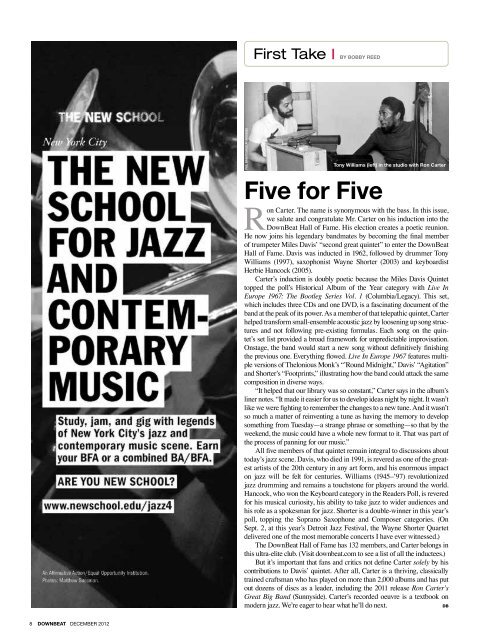Ron Carter Esperanza Spalding - Downbeat
Ron Carter Esperanza Spalding - Downbeat
Ron Carter Esperanza Spalding - Downbeat
You also want an ePaper? Increase the reach of your titles
YUMPU automatically turns print PDFs into web optimized ePapers that Google loves.
First Take | By bobby reed<br />
Phil Bray/DownBeat Archives<br />
Five for Five<br />
Tony Williams (left) in the studio with <strong>Ron</strong> <strong>Carter</strong><br />
<strong>Ron</strong> <strong>Carter</strong>. The name is synonymous with the bass. In this issue,<br />
we salute and congratulate Mr. <strong>Carter</strong> on his induction into the<br />
DownBeat Hall of Fame. His election creates a poetic reunion.<br />
He now joins his legendary bandmates by becoming the final member<br />
of trumpeter Miles Davis’ “second great quintet” to enter the DownBeat<br />
Hall of Fame. Davis was inducted in 1962, followed by drummer Tony<br />
Williams (1997), saxophonist Wayne Shorter (2003) and keyboardist<br />
Herbie Hancock (2005).<br />
<strong>Carter</strong>’s induction is doubly poetic because the Miles Davis Quintet<br />
topped the poll’s Historical Album of the Year category with Live In<br />
Europe 1967: The Bootleg Series Vol. 1 (Columbia/Legacy). This set,<br />
which includes three CDs and one DVD, is a fascinating document of the<br />
band at the peak of its power. As a member of that telepathic quintet, <strong>Carter</strong><br />
helped transform small-ensemble acoustic jazz by loosening up song structures<br />
and not following pre-existing formulas. Each song on the quintet’s<br />
set list provided a broad framework for unpredictable improvisation.<br />
Onstage, the band would start a new song without definitively finishing<br />
the previous one. Everything flowed. Live In Europe 1967 features multiple<br />
versions of Thelonious Monk’s “’Round Midnight,” Davis’ “Agitation”<br />
and Shorter’s “Footprints,” illustrating how the band could attack the same<br />
composition in diverse ways.<br />
“It helped that our library was so constant,” <strong>Carter</strong> says in the album’s<br />
liner notes. “It made it easier for us to develop ideas night by night. It wasn’t<br />
like we were fighting to remember the changes to a new tune. And it wasn’t<br />
so much a matter of reinventing a tune as having the memory to develop<br />
something from Tuesday—a strange phrase or something—so that by the<br />
weekend, the music could have a whole new format to it. That was part of<br />
the process of panning for our music.”<br />
All five members of that quintet remain integral to discussions about<br />
today’s jazz scene. Davis, who died in 1991, is revered as one of the greatest<br />
artists of the 20th century in any art form, and his enormous impact<br />
on jazz will be felt for centuries. Williams (1945–’97) revolutionized<br />
jazz drumming and remains a touchstone for players around the world.<br />
Hancock, who won the Keyboard category in the Readers Poll, is revered<br />
for his musical curiosity, his ability to take jazz to wider audiences and<br />
his role as a spokesman for jazz. Shorter is a double-winner in this year’s<br />
poll, topping the Soprano Saxophone and Composer categories. (On<br />
Sept. 2, at this year’s Detroit Jazz Festival, the Wayne Shorter Quartet<br />
delivered one of the most memorable concerts I have ever witnessed.)<br />
The DownBeat Hall of Fame has 132 members, and <strong>Carter</strong> belongs in<br />
this ultra-elite club. (Visit downbeat.com to see a list of all the inductees.)<br />
But it’s important that fans and critics not define <strong>Carter</strong> solely by his<br />
contributions to Davis’ quintet. After all, <strong>Carter</strong> is a thriving, classically<br />
trained craftsman who has played on more than 2,000 albums and has put<br />
out dozens of discs as a leader, including the 2011 release <strong>Ron</strong> <strong>Carter</strong>’s<br />
Great Big Band (Sunnyside). <strong>Carter</strong>’s recorded oeuvre is a textbook on<br />
modern jazz. We’re eager to hear what he’ll do next. DB<br />
8 DOWNBEAT DECEMBER 2012
















